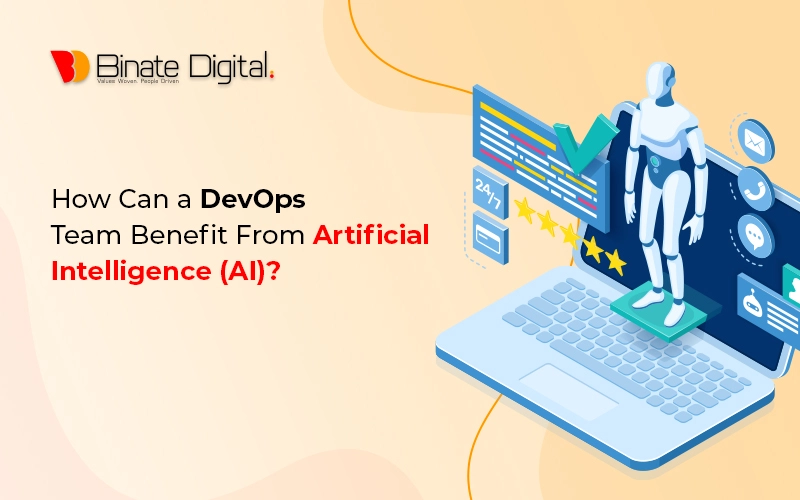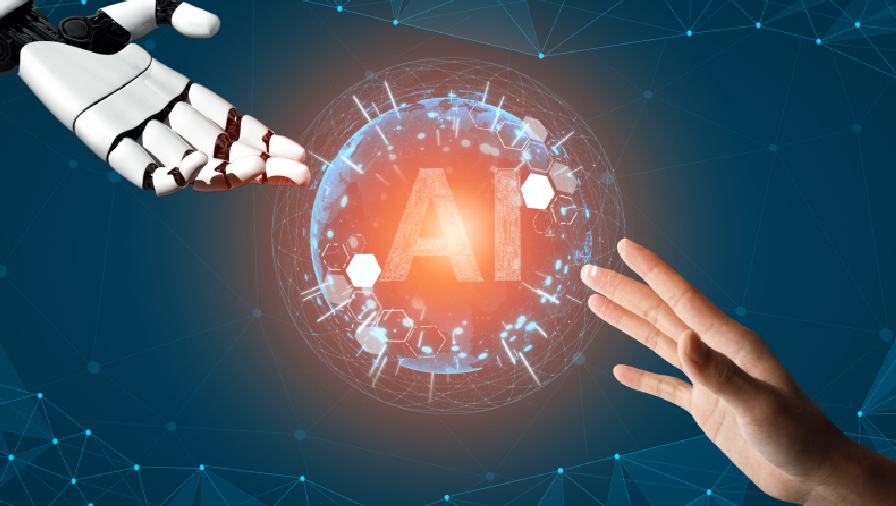In this rapidly unfolding landscape of software development and IT operations, though the fusion of development and operation expedites software delivery, the combination of the DevOps model and its practices with artificial intelligence (AI) is further expediting, enhancing, and streamlining the whole model for a DevOps team.
This harmonious synergy unleashes a myriad of advantages, propelling teams towards heightened efficiency, informed decision-making rooted in data, and elevated performance. This is achieved by empowering teams to make informed data-driven decisions, automating mundane and repetitive tasks, vigilantly monitoring and optimizing intricate systems, implementing intelligent incident management protocols, and fostering an enriched environment of collaboration and communication within the teams.
In this blog, we will delve into the intricate ways through which DevOps teams can benefit from the integration of AI, pulling aside the curtains from the nuances of automation, predictive analytics, collaborative communication, security fortification, and continuous improvement, diving into areas in which DevOps teams can or are leveraging AI for a multitude of purposes. So, without further ado, let’s dive into the article.
On this Article
Ways a DevOps Team Can Benefit from AI
There are numerous areas and ways DevOps teams can and are employing artificial intelligence in their routine work and other DevOps practices. Here are the top prominent areas and ways AI integration can be a game changer.
Automation and CI/CD
Apart from automation in CI/CD, with AI, tons of repetitive tasks can be automated, and you can take the quality of the delivery of software to the next level by employing the members of your team in more core areas to speed up the delivery.
With the integration of AI, a DevOps team can automate complex code-related tasks such as code integration, testing, deployment, etc. AI-driven tools reduce manual effort, i.e., time-consuming and self-training tasks like Continuous Integration can benefit from such tools as they automatically identify and find flaws or weaknesses, make suggestions for changes, and even merge code changes, reducing manual effort.
This not only expedites the whole coding and development process but also makes the meat of the software qualitative. Robust artificial intelligence and machine learning algorithms recognize the patterns in test data and deduce actionable insights from it, making it easier to identify and prioritize relevant tests. This synergy elevates the whole DevOps model by helping teams keep the system stable, deliver changes and updates instantly, and respond to ever-evolving requirements.
Just in case you are intrigued by now and want to adopt the DevOps model, you would need a DevOps engineer or engineers at the helm, and for that, you can leverage DevOps services, providing you with experienced people instantly after a little contract-related stuff.
Predictive Analytics
In safeguarding the collective efforts of the entire team, a DevOps team can strategically harness the power of artificial intelligence (AI) to identify potential discrepancies or anomalies proactively. By delving into historical performance data, AI not only detects subtle irregularities but also forecasts potential issues, providing timely reports that enable proactive intervention. This foresight ensures that you are informed about critical or irreversible situations well in advance, preventing untimely complications and allowing for timely corrective actions.
Machine learning algorithms are so robust that they can discern patterns or anomalies in patterns, development, or deployment pipelines, helping DevOps teams proactively address them. Apart from this, the integration also provides you with insights into system behavior and predicts performance trends, helping you take on them quite before they happen to reduce discrepancies and performance issues.
Continuous Testing with AI & Automated Testing
With artificial intelligence (AI) in testing, DevOps teams can have intelligent test cases generated that can come in handy to churn out adaptive testing strategies. DevOps teams can craft test cases and automate the testing that keeps progressing through a test. Such implementation can sift up the flaws, performing regression testing.
To further advance it, you can implement machine learning that keeps track of the past results of tests and gives insights accordingly. Such continuous and automated testing not only enhances the quality but also the coverage of development, and the output produced is more reliable as there are next to no chances of loopholes, shortcomings, and glitches in the software.
Smart Incident Management
AI and ML analyze past incident data and examine the history to identify common issues that tend to recur and recommend solutions based on past data. Chatbots with natural language processing capabilities can assist DevOps team members in troubleshooting, reducing response and resolution times.
AI-powered solutions can, in real-time, monitor system metrics, stats, analytics, logs, and events to ensure there are no anomalies and unusualities passing through, anticipate issues, and inform the DevOps teams. Such proactive management ensures a reliable end product and saves teams from running into issues that divert their focus from the core task.
If you are fascinated by what has transpired on this page but don’t want to go on a hiring spree, you can hire DevOps engineers from a reputed DevOps outsourcing company. They have qualified DevOps engineers, and you can always hire them for a negotiated fee.
Enhanced Collaboration and Communication
Collaboration in the DevOps model is paramount for the right delivery at the right time. Throughout the development, you keep going back to searching for different things and queries, and with the kind of results that appear on the Google search engine, you know, not specified, engineers keep googling, and it takes quite a considerable chunk of time.
But with artificial intelligence integrated into communication and collaboration tools, you know, with context and perspective implemented into the tools, DevOps team members can get precise and concise answers to their queries. AI-driven chatbots are very smart now; earlier, they were plain and bland, not quite useful, but they give you full-fledged answers to your queries after fathoming the context, so you don’t have to search for the same thing.
AI-driven chatbots facilitate real-time communication by giving back instant responses to queries of different sorts. This evolution happened after natural language processing (NLP) became so refined and advanced that it can now grasp communication context.
Security Automation
AI, with its robust capabilities and power, helps automate security processes, from identifying vulnerabilities, anomalies, and unusualities to responding to potential threats. And apart from AI, machine learning algorithms can detect abnormal behavior patterns, aiding in real-time threat detection.
Artificial intelligence (AI), based on past patterns and history, can promptly discern and detect unusualities and anomalies. This implementation comes in handy, especially when securing system logs from such behavior. If you want to take the integration to the next level, you can put such could-be breaches through some stringent tests with real-time intelligence.
Resource Optimization
During the whole development process, resources are always at the cornerstone of determining the success of software. It is crucial to ensure it is consuming only the necessary resources and not extra, making the system slow down. So, with the implementation of AI, DevOps team members can analyze resource usage patterns and recommend optimal resource allocation based on demand.
Deployment Risk Management
AI assesses deployment risks by analyzing historical data, dependencies, and potential issues. Decision support systems provide insights into potential risks and help in making informed decisions during deployments.
Infrastructure Management and Optimization
AI automates infrastructure provisioning, ensuring rapid and efficient resource deployment. Predictive analytics optimize infrastructure usage and optimize the whole pipeline to the point where it prevents over-provisioning, reducing costs.
Next-Level Monitoring
With artificial intelligence (AI) integrated into the pipeline through which you go through development, you can implement smart and intelligent monitoring that can take on incoming alerts and sift the trivial ones, reducing the pile of alerts for you to manually check and mark them and putting alerts with a high priority on top.
Such chatbots and virtual assistants are based on natural language processing (NLP), and they can fetch answers to your sudden questions. DevOps teams can leverage them to scrutinize specific raw data and extract insights, documentation, etc.
Chatbots and Virtual Assistants
At no cost, we can forget the AI-powered chatbots and virtual assistants integrated into your workspace and answer your team members’ queries and questions from the references and context of a specific niche or tech stack.
Ways AI is Transforming DevOps
Below are the areas where AI is bringing a revolution.
- Automation: AI is automating repetitive tasks that happen to be self-training and time-consuming. Apart from this, it automates testing, monitoring, communication, and a lot of other aspects.
- Prediction: With AI’s robust power of analyzing data and anticipating and foreseeing possible discrepancies and problems, inform DevOps teams so they can fix them before they happen.
- Optimization: Optimization is another name for the word “automation.” AI, throughout the development process, optimizes the software delivery so it hits the market sooner than anticipated.
- Collaboration: AI enhances, streamlines, and expedites the already supposedly optimized and fast synergy, i.e., DevOps. AI fosters collaboration between development and operation teams. Apart from this, AI and ML integrated into the workflow provide real-time data.
Pros of Implementation of AI in DevOps
- Top-notch Automation: AI in DevOps allows for the efficient execution of repetitive tasks, reducing manual intervention and enhancing overall productivity.
- Proper Predictive Analytics: AI empowers DevOps teams with predictive analytics that lets them take proactive measures.
- Improved Collaboration: AI fosters better collaboration among cross-functional teams by offering insights, automating communication, and streamlining workflows, resulting in more aligned, cohesive, and synchronized development processes.
- Continuous Improvement: Through AI-driven analytics, DevOps teams can continuously monitor, analyze, and optimize their processes, leading to ongoing improvements in efficiency, reliability, and overall software quality.
- Faster Resolution: AI assists in rapid issue detection and resolution, reducing downtime and enhancing the speed at which problems are identified and addressed within the development and operational phases.
- Scalability: The scalability of DevOps processes is enhanced with AI, allowing organizations to seamlessly adapt to changing workloads and requirements without compromising efficiency.
Cons of AI in DevOps
- Over-Reliance Leading to Laziness: Excessive dependence on AI can potentially lead to complacency and a decline in the hands-on skills of developers.
- Operational Costs: Implementing AI in operations comes with associated costs, including training, infrastructure, and maintenance expenses, which may pose financial challenges for some organizations.
- Complex Implementation: Integrating AI into DevOps can be a complex process requiring specialized knowledge and expertise. Implementation challenges may arise, making it crucial to plan and execute AI adoption carefully.
- Data Privacy and Security Concerns: The use of AI in DevOps raises concerns about data privacy and security. Organizations must ensure that sensitive information is adequately protected and that AI systems comply with relevant regulations.
- Lack of Transparency: AI algorithms may lack transparency, making it difficult to understand how certain decisions are reached. This lack of transparency can be a challenge, particularly when dealing with critical development and operational decisions.
Examples of AI and ML in DevOps
- Predictive Analytics: Using machine learning algorithms to analyze historical data and predict potential issues, teams proactively address problems before they impact the software.
- Intelligent Automation: Applying AI to automate complex decision-making processes within DevOps workflows reduces manual intervention.
- Chatbots: Integrating AI-driven chatbots for communication and support within DevOps teams enhances collaboration and provides quick responses to queries.
- Predictive Maintenance: Employing AI to predict when components or systems will likely fail makes you prepare for proactive maintenance and minimizes downtime.
- Anomaly detection: Machine learning can identify abnormal patterns or behaviors in system metrics and help teams detect potential issues or security threats early in the development environment.
Conclusion
Under the DevOps model, you have a synergy of development and operation, meaning these are no longer siloed, expediting software delivery. By harnessing the power of artificial intelligence (AI), a DevOps team can enhance and further accelerate the whole model and streamline operations and routine and complex processes. AI can help DevOps teams in numerous ways, from making data-driven decisions to automating repetitive tasks to monitoring and optimizing complex systems to implementing smart incident management to enhancing collaboration and communication within the team. For example, AI can be used to automatically provision and configure resources, deploy applications, monitor infrastructure, and identify potential issues before they cause downtime.







